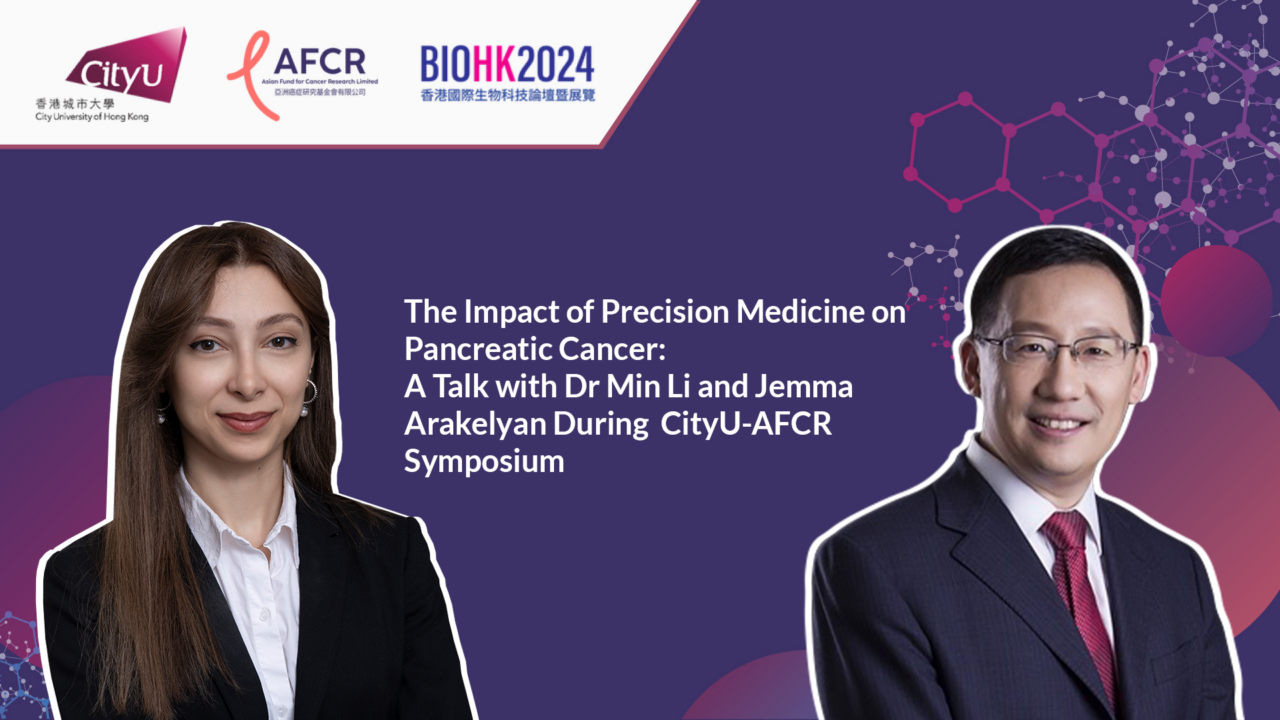During the CityU-AFCR Symposium at BioHong Kong 2024 on September 12-13, Dr. Jemma Arakelyan interviewed Dr. Min Li, Research Professor from The University of Oklahoma.
Dr. Jemma Arakelyan is a medical oncologist and the chief executive officer of The Institute of Cancer and Crisis. She is a Ph.D. candidate at the City University of Hong Kong. Her research focuses on developing new anticancer treatments and understanding the underlying mechanisms of cancer progression. In addition to her academic pursuits, she is an active member of several scientific organizations, including the European School of Oncology (ESO), where she served as an ambassador in Armenia from 2020-2022.
Dr. Min Li is George Lynn Cross Research Professor of Medicine, Surgery, and Cell Biology at The University of Oklahoma Health Sciences Center (OUHSC), and holds the Virginia Kerley Cade Endowed Chair in Cancer Treatment. He is the Assistant Dean for International Research Collaboration at the College of Medicine, and Associate Director for Global Oncology at the NCI-designated Stephenson Cancer Center (SCC). He is also Director of GI Cancer Research at the Department of Medicine, and Vice Chair for Research at the Department of Surgery, and Co-Leader of Cancer Biology Program of SCC at OUHSC.
Dr. Li is a leading expert on pancreatic cancer (PC), and his research mainly focuses on studying PC pathogenesis and developing new therapies. Dr. Li’s group is the first to identify a key zinc transporter ZIP4, which is aberrantly expressed in PC, and promotes cancer growth, drug resistance, muscle wasting, cachexia, and metastasis. He has published more than 200 papers and has four active NIH/NCI R01 grants, and multiple private foundation grants.
Dr. Li is a member of many NIH study sections, such as Developmental Therapeutics (DT), Cancer Etiology (CE), Basic Mechanism of Cancer Therapy (BMCT), Clinical Oncology (CONC), Mouse Model of Translational Cancer Research (MMTR), GI SPORE, Omnibus R21, DoD Cancer Research Program, AACR Pancreatic cancer action network (PanCAN), French NCI, Austrian Science Fund, Prostate Cancer UK, etc. He also serves as Editor-in-Chief, Deputy Editor, and editorial board member for many prestigious journals such as Cancer Letters, Clin Can Res, and BMC Medicine.
Dr. Li holds many important administrative positions in OUHSC, and he serve on multiple committees locally, nationally, and internationally. Dr. Li is the current President of American Pancreatic Association (APA). He is also the council member of the International Association for Pancreatology (IAP). He received many awards such as the Outstanding Achievement Award of IAP, and the Provost Research Award at OUHSC. He was nominated to National Academy of Medicine in 2022.
CityU-AFCR Symposium on Precision Medicine and Digital Medicine took place from 12-13 September as part of BIOHK2024, in Hong Kong Convention and Exhibition Centre. The symposium showcased presentations by experts in precision medicine, providing a dynamic platform for the exchange of innovative ideas and fostering a collaborative environment for advancements in the biotechnology field.
During CityU – AFCR Symposium Dr. Min Li spoke about a topic named ‘Pancreatic Cancer Precision Medicine‘ on September 12.

Jemma Arakelyan: Dr Li, what drove you to focus specifically on pancreatic cancer?
Min Li: It’s probably one of the worst diseases. When I was in grad school, I got my degree and got out of the lab. I talked to my PhD advisor. What should I focus on? He said; if you want to do something, pick the hard one.
I was a virologist by training. However, I took a class in the last year of my grad school. It was called oncogene and tumor suppressor gene. I was impressed with what I learned. I changed my field from virology to cancer research. That was 22 years ago. At that time, the worst cancer was pancreatic cancer. That’s how I got started with pancreatic cancer research.
Jemma Arakelyan: There are so many advancements in cancer treatment. For example, lung cancer, breast cancer. Not much for pancreatic cancer.
How do you see precision medicine changing the landscape of treatment for pancreatic cancer?
Min Li: Pancreatic cancer is highly heterogeneous. We usually treat different patients with the same medicine. We don’t have many options to offer. Chemotherapy is more like pain relieving.
With precision medicine we got to see the patient’s genotype and phenotype. We separate the patient with different subtypes, that largely benefit from the genomic medicine, pathology and cell biology. Now we know people have different cancers. If you have a basal-like pancreatic cancer versus a classic subtype, you treat them differently.
Precision medicine and the genomics change the landscape of treatment.
Jemma Arakelyan: Can we say that in the future, patients will have their ‘genetic passwords’? Based on that, they can receive the exact type of treatment that they need.
Min Li: That’s the key for precision medicine.
Jemma Arakelyan: My last question is, reflecting on your career and the impact of your work, what personal or professional achievements are you most proud of?
Min Li: Professional first. I love pancreatic cancer and pancreas.
I think that’s one of the most important organs in the human body, other than brain and heart. You can live without brain. But you can’t live without pancreas.
My goal is to find a better treatment for pancreatic cancer. My most proud achievement is, 20 years ago, we first identified a new target (zinc transporter ZIP4).
It doesn’t just control the tumor cell growth, metastasis, it also controls metabolism and metabolic reprogramming. We call it a master switch gene. Hopefully we will develop a targeted therapy against pancreatic cancer based on the ZIP4 profile in the near future.
We were the first group that started this new field, which has a cancer-preventing impact. That’s my major and professional achievement.
Jemma Arakelyan: Thank you for your time.
For more information about CityU-AFCR Symposium visit oncodaily.com


